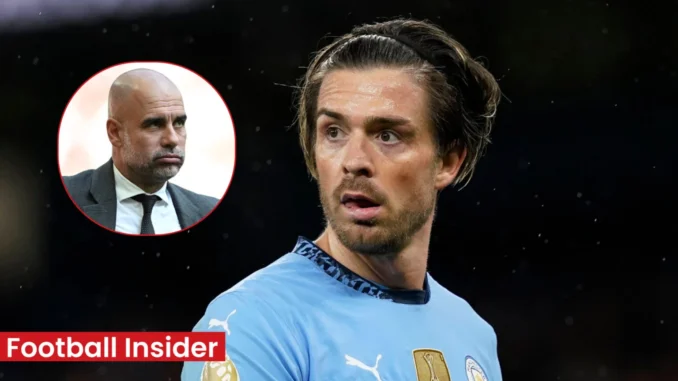
The ongoing speculation surrounding Jack Grealish’s future at Manchester City has sparked heated debates among fans and pundits alike. Recently, Stefan Borson, a former football executive and vocal commentator on Premier League affairs, delivered a bold verdict on the situation, shedding light on what could become one of the most talked-about transfer sagas in recent years.
Grealish, who arrived at Manchester City from Aston Villa in 2021 for a British record fee of £100 million, has been a divisive figure since his move. While some hail him as an exceptionally talented playmaker capable of producing match-winning moments, others argue that he has yet to fully justify his hefty price tag. This has led to persistent rumors about a potential move away from the Etihad Stadium, with several clubs reportedly interested in acquiring his services.
Borson’s recent comments have added fuel to the fire. The former financial executive, known for his sharp insights into the business side of football, suggested that Manchester City might consider accepting a substantial offer for Grealish under the right circumstances. According to Borson, the decision would ultimately depend on several factors, including the player’s market value, his role in Pep Guardiola’s tactical plans, and the club’s broader financial strategy.
“Jack Grealish is undoubtedly a talented player, but football is a business, and clubs like Manchester City always have to think long-term,” Borson remarked. “If an offer comes in that aligns with their financial and sporting objectives, they’d be foolish not to at least consider it.”
This statement has sparked intense debate among Manchester City supporters. Grealish has shown flashes of brilliance during his time at the club, with standout performances in crucial games, including during City’s treble-winning 2022–2023 season. His ability to retain possession under pressure, draw fouls, and create opportunities for teammates has made him a valuable asset in Guardiola’s system. However, critics argue that his overall contribution, particularly in terms of goals and assists, has not matched the expectations that come with being the most expensive player in British football history.
From a financial perspective, Borson’s analysis makes sense. Grealish remains a high-profile player with significant market value, and selling him could free up funds for Manchester City to pursue other targets. Guardiola’s side is known for its fluid approach to squad building, frequently refreshing the team with new talent while offloading players who no longer fit their evolving strategy. If City were to receive a substantial offer, potentially from a club with deep pockets, it could open the door for reinforcements in other areas of the squad.
Rumors have linked Grealish with a move to several top clubs, both in the Premier League and abroad. Clubs in Spain and Italy have reportedly expressed interest in the England international, viewing him as a player who could thrive in their leagues’ more technical and less physically demanding environments. Additionally, some Premier League rivals are said to be monitoring his situation closely, though a domestic transfer would likely come with a premium price tag.
However, selling Grealish is not a straightforward decision for Manchester City. Guardiola has often spoken highly of the player, praising his work ethic, football intelligence, and ability to adapt to the team’s demanding style of play. Grealish’s contributions in big games, particularly his defensive work rate and willingness to sacrifice individual glory for the team’s success, have made him a trusted figure in Guardiola’s squad. Letting him go could disrupt the delicate balance of the team, especially if a suitable replacement isn’t immediately available.
Furthermore, Grealish’s off-field value cannot be overlooked. As one of the most marketable English players, he has a significant commercial impact, boosting Manchester City’s global profile. His charisma, combined with his performances for both club and country, has made him a fan favorite and a key figure in the club’s branding efforts.
For Grealish, the prospect of a move might offer an opportunity to redefine his career. While he has enjoyed success at Manchester City, including winning the Premier League, FA Cup, and Champions League, a transfer could provide a chance to take on a more central role at another club. At City, he often shares the spotlight with other stars like Kevin De Bruyne, Erling Haaland, and Bernardo Silva, which sometimes limits his ability to fully express himself on the pitch.
Borson’s remarks also highlight the broader challenges faced by elite clubs in managing their squads. Balancing the desire for stability with the need for constant evolution is a delicate task, especially in the ultra-competitive world of modern football. For Manchester City, any decision regarding Grealish will need to account for both the short-term impact on the team and the long-term implications for the club’s strategy.
As the January transfer window approaches, speculation about Grealish’s future is likely to intensify. Whether City ultimately decides to accept an offer or hold on to their record signing will depend on a variety of factors, including the player’s form, the team’s needs, and the availability of potential replacements. One thing is certain: the outcome of this saga will be closely watched by fans and analysts alike, with significant implications for both Grealish’s career and Manchester City’s ambitions.
For now, Jack Grealish remains a Manchester City player, focused on helping the team achieve more success. Whether he stays at the Etihad for the long haul or moves on to a new challenge, his time in the spotlight is far from over. The coming months will reveal whether Borson’s prediction proves accurate and if City is willing to part ways with one of their most high-profile players in pursuit of their ever-evolving goals.
Leave a Reply